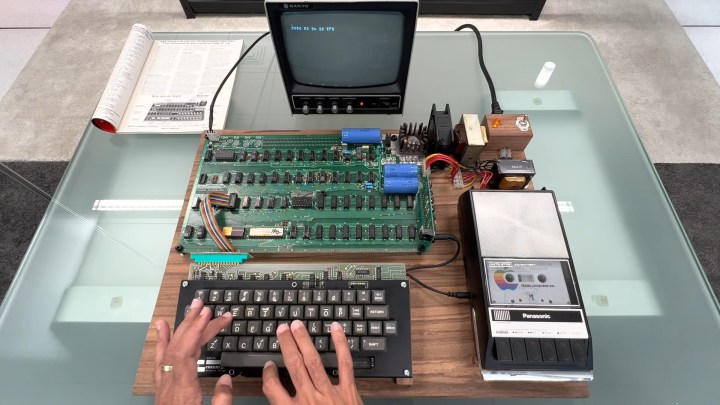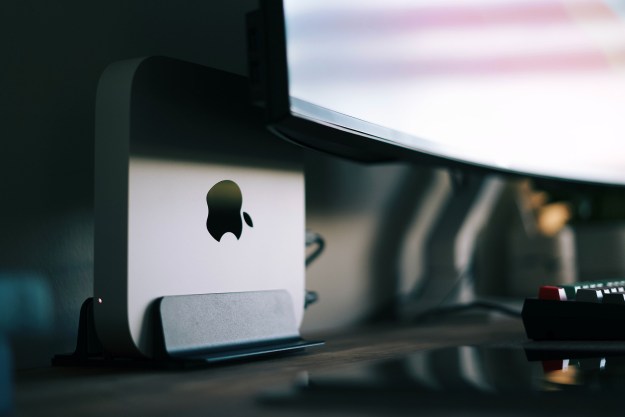You can now own a key piece of Apple history, and it’s even signed by Steve Wozniak himself — as long as your wallet can handle the price.
The legendary Apple-1 computer, first assembled by Wozniak and Steve Jobs in the Jobs’ family garage, is now up for auction. It’s functional, fully equipped, and in near-mint condition. The catch? It might fetch a price of around $500,000 by the time the auction ends on June 12.

Apple-1 is the first computer created by Apple in 1976. Only 200 of them were ever made prior to the company moving on to Apple II, and of those 200, very few remain. That number grows even smaller when you consider the fact that this particular Apple-1 computer is in working condition, has been professionally restored, and it bears the signature of Apple founder Steve Wozniak. All of that put together should add up to an overwhelmingly high price because what we see here is a true gem and a piece of computing history.
The computer, currently in the possession of The AAPL Collection, awaits its new owner in Dubai — but it can be shipped worldwide. This computer is known as the “Schlumberger 2” Apple-1 due to the fact that it was originally sold to an oil services company called Schlumberger Overseas in 1977. It comes from the second batch of Apple-1 computers and is likely one of the last ones that were assembled in the Jobs’ family garage in late 1976 or early 1977.
The Apple-1 was the first personal computer with a fully assembled motherboard, and the motherboard in this model is in shockingly good condition, with hardly any blemishes. The auctioned machine has retained most of its original components. The Apple-1 did not come with a case, and this one doesn’t either. Instead, the green motherboard sits proudly on display atop the Brazilian walnut wood slab to which every component is mounted. It also sports the white ceramic Synertek 6502 microprocessor, signed by Wozniak in 2021.
Aside from the computer itself, the auction includes all of the period-accurate goodies that help it run. The lucky buyer will also receive a Sanyo monitor, Panasonic cassette recorder, a replica of the Apple-1 Cassette Interface, and a Cherry keyboard. In addition to these devices, the auction winner will also receive a photocopy of the Apple-1 Operator’s manual alongside a couple of period magazines with articles penned by Steve Jobs.
The fact that the monitor and the keyboard are all external additions is not at all shocking. The first Apple-1 computer was sold without a casing, keyboard, or monitor. It didn’t even have a power supply. It was originally priced at $666.66, and only around 175 units were ever sold. With the introduction of the Apple II, the price of the first device dropped to just $475. Needless to say, this eBay listing will not come anywhere near as cheap.
As of right now, the price sits at $100,000, with around 70 bids already placed. However, as The AAPL Collection notes, similar devices have sold for much more than that quite recently. The price average, based on six sales that took place between May 2019 and May 2022, sits at an enormous $527,715. A similar model sold in November 2021 for $500,000. Considering that this Apple-1 computer is fully operational (as shown in the video above) and in great condition, the price might still skyrocket from the current bid.
If you’d like to read a bit more about the Apple-1 and view some high-res imagery of the computer, make sure to check out the listing directly on eBay. This unique piece of Apple history certainly won’t be sold on the cheap, but admiring it from afar certainly makes one appreciate how far technology had come in the last few decades — especially with WWDC 2022 coming up next week and all the new Apple releases that it might bring.
Editors' Recommendations
- Why I finally gave up and embraced Apple’s walled garden
- Steve Jobs’ handwritten Apple-1 ad fetches big bucks at auction
- Apple Mac Mini M2 vs. M1: don’t make a buying mistake
- An original Apple-1 computer was just sold for an unimaginable amount of money
- Apple M2 smokes the $6,000 Mac Pro and M1 MacBook Pro, leaked benchmark shows




